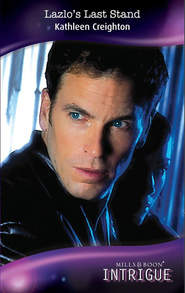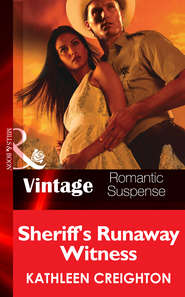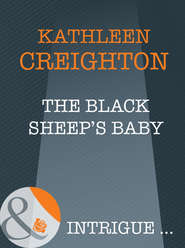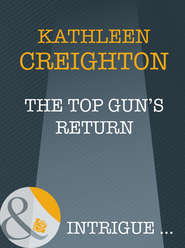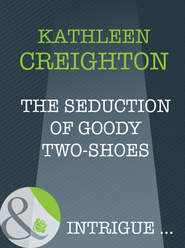По всем вопросам обращайтесь на: info@litportal.ru
(©) 2003-2025.
✖
The Cowboy's Hidden Agenda
Автор
Год написания книги
2018
Настройки чтения
Размер шрифта
Высота строк
Поля
“Are you going to kill me?”
Bronco halted as if she’d thrown something at him, one foot still on the plank step, the other already on the ground. Then he pivoted slowly back to face her. With his arms braced, one on the door, the other on the frame, he appeared to bar the way as if he actually thought she might try a break for freedom.
In contrast to the tension and the unspoken dominance in his posture, his chuckle sounded almost friendly. “Kill you? Why would we do that? You’re worth too much to us alive.”
“Worth what? Us? We? Wait—” Who are you people?
But the door had closed between them, and her only answer was the heavy thunk of the steel bar dropping across it.
Lauren stood and stared at the rough boards while her heart bumped painfully against her breastbone and her eyes burned in their sockets. Silent sobs scoured her throat. But though her jaws cramped and her body trembled with the strain, she held them back. She would not cry. If she did…well, for one thing, she’d never forgive herself.
Besides, something told her that once she gave in to the fear she was beaten. She didn’t know who these people were or why they’d taken her prisoner, or why they thought she’d be of value to them, but as long as she was alive and kept her wits about her, they hadn’t won. No sir. It would take a lot more than being locked up in a saddle house to defeat Lauren Elizabeth Brown! Hadn’t her aunt Lucy told her once that she was descended from a woman who’d survived an Indian attack by setting fire to her own homestead, then tying her baby up in her apron and climbing down into a well? And come to think of it, hadn’t Aunt Lucy herself, all of five feet tall and a hundred pounds soaking wet, once thwarted her own kidnappers by setting fire to the Chicago high-rise they were holding her in?
She could almost hear Aunt Lucy’s funny rusty-nail voice saying, “Just don’t lose your head, Lolly Brown. Keep your wits about you, and you’ll be all right.”
Keep your wits about you. Think, Lolly, think!
Lolly. She hadn’t thought of that childhood nickname in years. Her brother Ethan had begun calling her that because when he was little he couldn’t pronounce the name Lauren. She remembered how she’d hated it when he’d learned that stupid song: “Lollypop, Lollypop, oh, Lolly Lollypop…” She’d punched him good for singing it, too, more than once. But nobody had called her that since…oh, Lord, it must have been since she was ten or eleven years old. Yes, it had been—the year her parents divorced, the year she’d gotten her first horse, Star. The year Dixie had come to live with them. The year…
Then the memories were tumbling in on her, memories of the one time before in her life when she’d known fear like this. When she’d felt as utterly and desperately alone. This wasn’t the first time she’d been taken and held against her will.
That other time, of course, she hadn’t been alone. Even now, sixteen years later, she could feel Ethan’s small hand creeping into hers, feel his warm body snuggling against her for warmth and comfort, hear his quivering voice whispering, “Lolly? Will you sing me a song?” even though he knew she couldn’t carry a tune in a bucket. Ethan—her baby brother—twenty-two years old now, and a premed junior at UCLA. But she could still remember as if it were yesterday the overwhelming burden of responsibility that had made her feel even more alone. This time, at least, she had only herself to think about.
Oh, but that’s not true.
No, it wasn’t true at all. Because suddenly she knew why she was here, locked in this saddle house on an Arizona horse ranch. She knew why she was worth something to these people, even if she didn’t know exactly who they were.
It was because they knew who she was.
“Hi, I’m Lauren Brown—we spoke on the phone? About that bay stud you have for sale?”
Gil McCullough’s vivid blue gaze narrowed as it swept over her in openly masculine appraisal, producing a charming fan of creases in the tanned skin at the corners of his eyes. He held the hand she’d offered just a beat longer than necessary, while his smile broadened to reveal strong vaguely predatory teeth.
“Well, hello, Lauren Brown. I sure do remember our phone conversation, but tell you the truth, I wasn’t expecting to see you till tomorrow.” And yet his tone said plainly he didn’t mind all that much that she’d come early. It was a ploy Lauren recognized, designed to disarm her and at the same time put her on the defensive.
In fact, the man McCullough was himself a type she recognized, and about what she might have expected from the brief conversation she’d had with him on the phone. He was big, lean and weathered, with a full head of silver-gray hair worn in a crewcut, a cowboy’s squint and a strong clean-shaven jaw. A handsome man, which she also could have guessed, given his supreme self-confidence and slightly seductive tone on the telephone. The only surprise was an almost military bearing that set him well apart from the ranchers she’d come to know back in Texas. Most of them, neighbors of the Tipsy Pee, were rump-sprung, stove-up and gimpy-legged by the time they were fifty, from too much time spent either on top of or getting thrown off some four-legged beast or other. She’d have to peg Gil McCullough as more the executive type, one who’d come to ranching as a hobby after acquiring his wealth in some other more dependable line of work. The type who patrolled his lands and herds from four-wheel-drive vehicles and sleek single-engine airplanes. In any case, an alpha male through and through, absolutely certain of his dominance over men and women alike.
Fortunately Lauren wasn’t intimidated by such men. Or attracted to them, either. She couldn’t be and have much hope of surviving—and thriving—in the legal profession. She’d managed to do both those things by meeting such men head-on, armed with her own arsenal of brains and self-assurance—tempered, when necessary, with a judiciously applied veneer of feminine charm.
“When necessary” meant she wasn’t above employing a healthy dollop of that charm now. Which was why, before answering, she took off her hat and finger-combed her blond hair back from her damp forehead as she slanted a smile to meet the rancher’s mildly rebuking frown. “Well, now, Mr. McCullough—”
“Aw, call me Gil, honey—please.”
“Well, Gil, honey,” she said softly, teasingly, “you know, you weren’t very forthcoming about giving me a price. I figured I’d better get on over here and talk to you face-to-face, see if we can agree on the numbers before I take a look at the horse.”
McCullough laughed playfully, showing those formidable teeth. “Well, yeah, but that’s the idea, don’t you see? You’ve got to come see ol’ Cochise Red before I tell you my price.”
Lauren laughed, too, even producing a dimple. “Oh, but that’s not fair. See, I know what you’re up to. You’re trying to get me out there to see him so I’ll fall in love with him. Get me so set on having him, I’ll agree to any price!” Several of the men lounging in the cottonwood shade near the camper laughed, and someone called, “She’s got your number, Gil.”
McCullough drew himself up in mock offense, a subtly aggressive posture disguised as banter. “You bet I am. Hey, listen—let me tell you something. Cochise Red’s one helluva horse. Whoever gets him’s gonna have to pay me what he’s worth. And tell you something else—whoever meets my price is gonna get their money’s worth.”
“Oh, I believe you, Gil,” said Lauren earnestly. “Everything I’ve seen and heard so far tells me I’m probably going to get my heart broken, but—” she sighed heavily and ducked her head in order to settle her hat back in place “—you have to understand, if it was my money I was spending…” She looked up again, and this time injected wistfulness into her smile. “But unfortunately, it’s not up to me. I’m just the agent for the Parish family—I thought you understood that. I’m authorized to go only so high, and if your asking price is beyond my limit, well, much as I hate to think I’ve come all this way for nothing, there’s just no point in taking it any further. Sorry to have bothered you, Mr. McCullough. Maybe we can do business another time.” She tilted her head in a little nod of farewell, then pivoted and began to walk away, hips swaying, fingertips tucked in the pockets of her jeans, head down, watching her boots scuff through the dust. A picture of dejection, with a tinge of sex appeal.
She’d gone maybe five steps—which was a couple more than she’d estimated it would take—when McCullough fell into step beside her and draped a fatherly arm across her shoulders. She halted instantly, and he took the arm away when she turned.
“Ah, hell,” he said, and appealed briefly to the cloudless sky as if for guidance, his squint perplexed. “You know what, I’d really hate for you to come all the way from Texas for nothing. What you and me need to do is sit down somewhere, have us a cold beer and a nice dinner, and talk. What do you say?”
“Well, I—”
“Tell you what.” His hand was on her shoulder again, his head lowered close to hers. “Right now I’ve got to go find my heeler—sounds like they’ve started in on the steer wrestlin’, and that means team ropin’s comin’ up next. But why don’t we—”
“You rope?” Lauren was surprised; she hadn’t taken him for the working type.
McCullough winked, showing those teeth again. “I like to keep my hand in now and then.” He reached out to waylay a cowboy with a contestant’s number on his back coming from the direction of the arena. “Hey, Dub, seen Bronco anywhere?”
The cowboy jerked a thumb over his shoulder. “Last I seen he was over at the stock pens.”
McCullough laughed. “Talkin’ the steers into lettin’ him rope ’em, I imagine.”
“Bronco,” said Lauren, when the cowboy had shared the joke and the laughter and moved on. “Is that the same one I just saw up on a bareback bronc?”
“That’s the one.”
Lauren smiled as McCullough walked her on, his arm friendly across her shoulders. “Does he rope as well as he rides?”
“Honey,” the rancher drawled, “anything involving a horse, there’s nobody in this world better. Tell you what,” he added more briskly, giving her a quick squeeze before releasing her, “why don’t you meet me for dinner tonight? A lot of the rodeo crowd, they like to get together evenings at Smoky Joe’s—know where it is? Can’t miss it—just outside of town on the highway. You’ll hear it before you see it. ’Bout eight o’clock? Good—we’ll see you there.”
And he left her to go angling off toward the livestock pens with that curiously military stride, now and then nodding to acquaintances as he moved through the crowd.
Left behind, Lauren exhaled in an exasperated gust. Then she shrugged and glanced at her watch. Maybe she’d stick around and watch the team-roping before heading back into town. After that she’d see about checking into a motel, maybe catch up on the sleep she’d missed last night before it was time to put on her war paint and strap on her armor and head for the showdown with McCullough.
She smiled to herself, exhilarated at the thought of the battle ahead. She knew McCullough’s type. If she played him right, the stallion Cochise Red was as good as hers.
Chapter 2
Bronco stood with his back and one foot propped against a corral fence post and watched the eastern sky turn from indigo to purple to mauve, to a gaudy shade of salmon streaked with gold. Ordinarily sunrise was his favorite time of day—something in his genes, he guessed, remnants of an ancient reverence of his father’s people for the Creator Sun. But this morning the appearance of that molten sliver brought him no joy. This morning it was only a prod and a portent: Time to go—bad times coming. He and the woman must be well away before they got here.
Lauren Brown. He knew Gil figured she was his trump card, but Bronco knew for a fact that taking her would prove to be the biggest mistake McCullough ever made. He also knew there was no point in trying to tell the commander that; Bronco had run into officers like him before. A smart man but arrogant, and a fanatic on top of it—a bad combination, especially when combined with some real power. It was such men, Bronco believed, who made the decisions that lost wars and turned the tides of history.
By this time, though, he himself was pretty fatalistic about the whole thing. The commander had been dead-set on this plan, and now that he’d put it in motion, Bronco figured there wasn’t much anybody could do to stop it. A bad business, destined for a bad end—for somebody. Bronco meant to make damn sure it wasn’t him.
He glanced at his watch, then looked over toward the small split-log building with the reflected glow of pinkish-yellow light showing in its barred window. After a moment he straightened and pushed away from the fence post. Her ten minutes was up. He slapped his gloves once against his Levis, then drew them on and headed for the saddle house. On the way he couldn’t help but notice that his boots were hitting the hard dirt in the same rhythm as the song inside his head, the one that kept singing: She’s bad news…bad news…bad news.
But the picture in his mind that went with the song didn’t look like bad news. It was the picture of Lauren Brown walking into Smoky Joe’s last night, looking like a Texas sunflower….
Johnny Bronco’s Saturday-night routine was a well-established tradition at Smoky Joe’s Bar and Grill. He’d generally arrive around seven o’clock, choose his favorite table along the back wall near the rest-room door and order a hamburger medium well along with the first of what usually amounted to about six beers. He’d work on the burger and the beers between trips to the dance floor and the men’s room and trying to hit on any good-looking women that happened to be in the place, until along about eleven, twelve o’clock when he’d pick a fight and get himself thrown out on his butt. The regular patrons of Smoky Joe’s didn’t seem to mind this, had even come to expect it as an essential part of the evening’s entertainment, and the management didn’t hold it against him as long as nothing got broken and nobody got hurt.
Anyway, people around there tended to cut Johnny Bronco quite a bit of slack, just as they had way back in the days when he’d been the hometown football hero, all-conference wide receiver and all-time leading scorer for the White Mountain Mustangs. Locally, there were two things a man could do that would pretty much guarantee him universal respect: be good with a football or be good with horses. Johnny Bronco happened to be both. It was a pretty sure bet that after the kind of show he’d put on out at the rodeo arena that afternoon, he wasn’t going to have to pay for very many of those beers.






